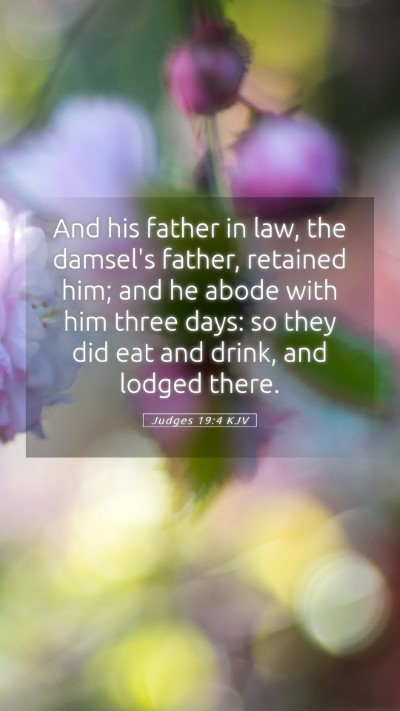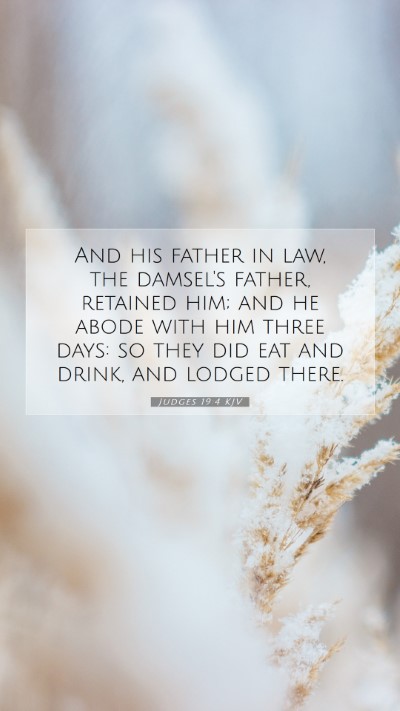Bible Verse Explanation: Judges 19:4
Judges 19:4 serves as a pivotal verse in the narrative surrounding the Levite and his concubine, highlighting themes of hospitality, moral decay, and the societal tensions of the time. This verse can often leave readers seeking a deeper understanding of its implications and lessons.
Contextual Background
The context of Judges 19 is essential for understanding the depth of the moral and ethical dilemmas presented. The period of the Judges was marked by chaos and a lack of centralized authority in Israel. The people of Israel were without a king, resulting in moral ambiguity and civil strife.
Interpretative Insights
Various public domain commentaries provide profound insights into Judges 19:4.
-
Matthew Henry:
Henry emphasizes the Levite’s journey to reclaim his concubine, portraying a desperate attempt to restore his fractured relationship. The Levite’s choice to seek her in Bethlehem reflects both a cultural norm of the time—valuing familial bonds—and a sign of the societal decay that prevailed. His character is pivotal in understanding the underlying societal themes.
-
Albert Barnes:
Barnes provides a historical lens, pondering the implications of the Levite's actions within the broader narrative of Israelite society. He suggests that the Levite represents a moral standard eroded by the zeitgeist of the times. The reference to Bethlehem's hospitality sheds light on the expectation of kindness that contrasts sharply with the subsequent events of the narrative.
-
Adam Clarke:
Clarke's analysis delves into the nature of the Levite's relationship with his concubine, pointing out its contentiousness. He remarks on the significance of the location and the responsibilities of family and community during this tumultuous period. Through this lens, the verse speaks to both personal choices and communal obligations in a degraded society.
Thematic Analysis
In Judges 19:4, themes of hospitality, loyalty, and the consequences of societal decline emerge clearly.
-
Hospitality:
The expectation of hospitality is central to ancient Near Eastern culture, reflecting a sacred duty to protect travelers and guests. The Levite's reception in Bethlehem raises questions about the community's commitment to these values.
-
Moral Decay:
The Levite’s journey mirrors the wider societal issues plaguing Israel. This verse encapsulates a community that once thrived on stronger ethical principles now spiraling into moral ambiguity.
-
Loyalty and Relationships:
The dynamics between the Levite and his concubine underscore themes of loyalty, trust, and the personal ramifications of societal norms. Their relationship becomes a microcosm of the larger social commentary presented in Judges.
Application to Daily Life
Understanding Judges 19:4 enables us to reflect on our responsibilities toward others in our communities, especially in terms of hospitality and moral uprightness. Presenting these applications can help engage contemporary readers in deriving meaning from the text.
Cross-References
Several biblical passages complement the themes presented in Judges 19:4:
- Genesis 19:1-3: The hospitality extended to Lot in Sodom serves as a stark contrast to the events in Judges.
- Matthew 25:35: Jesus’ teaching on hospitality and caring for the marginalized resonates with the expectations set forth in Judges.
- 1 Samuel 25: The story of Abigail highlights the importance of wise and moral choices in difficult circumstances, mirroring the Levite's plight.
Conclusion
Judges 19:4 invites readers into an exploration of critical moral and ethical questions that remain relevant today. Understanding Scripture through the lens of history and commentary enriches our Bible study insights and enhances our grasp of ongoing spiritual lessons.
Further Study Suggestions
For those interested in deeper exploration, consider utilizing Bible study tools or engaging in Bible study groups focused on thematic studies of Old Testament narratives.


